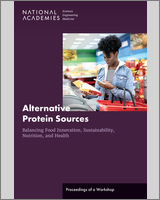NCBI Bookshelf. A service of the National Library of Medicine, National Institutes of Health.
National Academies of Sciences, Engineering, and Medicine; Health and Medicine Division; Food and Nutrition Board; Food Forum; Nicholson A, editor. Alternative Protein Sources: Balancing Food Innovation, Sustainability, Nutrition, and Health: Proceedings of a Workshop. Washington (DC): National Academies Press (US); 2023 May 24.

Alternative Protein Sources: Balancing Food Innovation, Sustainability, Nutrition, and Health: Proceedings of a Workshop.
Show detailsThe Food Forum of the National Academies of Sciences, Engineering, and Medicine convened a public virtual workshop titled Alternative Protein Sources: Balancing Food Innovation, Sustainability, Nutrition, and Health on August 17–18, 2022.1 The workshop opened with welcoming remarks from planning committee chair Rodolphe Barrangou, North Carolina State University, who briefly described the Food Forum’s activities and the workshop’s agenda and aims. The primary objective of the workshop was to examine the state of the science on alternative protein sources with respect to diet quality, nutrition, and sustainability. Because there is no set definition for an alternative protein source, the workshop included discussions on a variety of alternative protein sources, such as those derived from plant and animal cells; plant-based sources, such as beans and soy; insect-, algal-, and fungal-based sources; and sources produced through fermentation.
During the workshop’s first session, presenters and panelists explored current challenges in the alternative protein landscape, including health, environmental, socioeconomic, and ethical issues related to increasing dietary intake of alternative proteins (Chapter 2). The second session focused on the implications of expanding the breadth and consumption of alternative protein products from the perspectives of industry, consumers, and regulators (Chapter 3). The workshop’s final session looked at different food processing methods for developing alternative protein products, and considered how to balance these technological innovations in a way that minimizes deleterious environmental effects while optimizing nutritional content, affordability, and accessibility (Chapter 4). The workshop agenda, acronyms and abbreviations used in this publication, and biographical sketches of the workshop speakers and planning committee members can be found in Appendixes A, B, and C, respectively. The workshop’s statement of task is in Box 1-1.2
BOX 1-1
Workshop Statement of Task.
Footnotes
- 1
The workshop agenda, presentations, and other materials are available at https://www
.nationalacademies .org/event/08-17-2022 /alternative-protein-sources-balancing-food-innovation-sustainability-nutrition-health (accessed August 25, 2022). - 2
The workshop planning committee’s role was limited to planning the workshop. This Proceedings of a Workshop was prepared by an independent rapporteur as a factual summary of what occurred at the workshop. Statements, recommendations, and opinions expressed are those of independent presenters and participants, and are not necessarily endorsed or verified by the National Academies of Sciences, Engineering, and Medicine, nor should they be construed as reflecting any group consensus.
- Introduction - Alternative Protein SourcesIntroduction - Alternative Protein Sources
Your browsing activity is empty.
Activity recording is turned off.
See more...